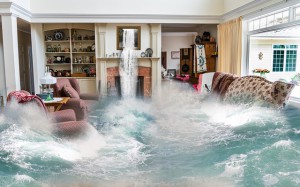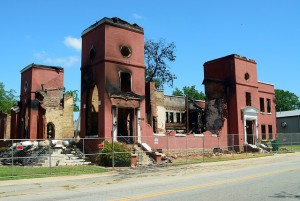Renter’s Insurance is taken out on property you rent to insure against damage or loss. Renter’s insurance works in a similar fashion to homeowner’s insurance. Homeowner’s insurance is designed to cover damage to a home’s interior and exterior, the theft of possessions, and personal liability for harm to others, for example if someone fell down your porch steps and sued you.
As a renter, it may seem like the landlord would have you covered, but this is only partly true. For example, if there is a fire at your apartment building caused by one of your neighbors, your landlord’s insurance would cover the repairs to the building, and his possessions (like any appliances of furniture provided in the rental units), but it would not cover any of your personal items that were destroyed.
Most renters think their items are not worth very much, so purchasing renter’s insurance isn’t a priority to them. But when renters actually take the time to calculate the replacement cost of all of their items, the totally is usually over $20,000. Would you have $20,000 in the bank to replace everything you own? Probably not. This is why renter’s insurance is important.
What Does Renter’s Insurance Cover?

Renter’s insurance applies to most events in which your personal property is damaged or stolen. This includes fires, plumbing leaks, lightning damage, items stolen during a burglary, items damaged by vandals or rioters, and items broken due to cold or hot weather. Renter’s insurance can also protect you if a guest gets injured on your property and wants to sue you.
There are three main areas of protection you receive through a basic renter’s insurance policy:
Your Personal Property

The most commonly needed type of renter’s insurance coverage is coverage of possessions in case of theft or damage. As a “best practice,” at least once a year, you should walk through your apartment or rental property with a video camera. Video tape everything of value that you would want replaced if it gets stolen or damaged. You will not need this video in order to get an insurance policy, but if something is stolen or damaged down the road, your video will show proof that you owned the item that now needs to be replaced.
You can also take pictures of your valuable items. Store the pictures or the videotape in a safe place away from your home so if there is a fire or water damage, your documentation is not lost. Before the days of digital storage, experts would recommend storing your videos or pictures in a bank safety deposit box along with a copy of your insurance policy. But you can now store the documentation in a cloud storage service like Google Drive or Dropbox so it can be accessed from anywhere.
Your Shelter

If your apartment burns down or gets damaged due to a water leak, you probably will not be able to sleep there until the damage is fixed. If you have renter’s insurance, the policy will include a clause about “Loss of Use.” This means that if you cannot use your rental apartment, your insurance company will pay for lodging expenses while the damage is being repaired. That way you will always have a place to stay. There is usually a daily dollar amount that they will pay for your temporary housing, so don’t book a room at a fancy hotel because you’ll have to pay the difference.
You
Renter’s insurance also acts as liability insurance for you against your guests. If you have a visitor to your home who gets injured and wants to sue you, your renter’s insurance will cover the lawsuit claim (up to a point), including legal fees.
What Rental Insurance Does Not Cover
There are a few cases where damages will not be covered by a standard renter’s insurance policy, so make sure you understand these exceptions before filing a claim.
Floods

Most natural floods (from heavy rain and river overflows) are not covered by standard renter’s insurance policies. If you are worried about flooding, you can usually purchase an additional “Flood Insurance” policy.
Earthquakes
Just like floods, earthquake damage is not covered by default in most renter’s insurance policies but can be purchased as a secondary policy. If you are moving to a state you are not familiar with, make sure you ask if earthquake insurance is recommended for renters. It will be worth the extra cost if you need it.
Hurricanes
While most normal storm damage, like lightning strikes and hail damage, is covered through renter’s insurance, hurricane damage is not. You will need to acquire a separate policy to cover hurricane damage.
Intentional Damage
Any damage you cause on purpose is not covered. For example, if you get angry and punch a hole in the wall or kick down a door, your renter’s insurance will not cover the necessary repairs. If you make any fraudulent claims, such as saying that items were stolen (when you really threw them away) or that the kitchen fire destroyed your brand new laptop (when it was really 3 years old), you are committing insurance fraud which can land you in prison.
Getting Reimbursed
If you need to file a claim with your insurance company, there are two types of reimbursement to choose from. You make this choice at the time you take out your insurance policy. The differences are important for you to understand. Both types are subject to your policy limit. The policy limit is the maximum amount the insurance company will pay for each claim.
Option 1: Replacement Cost Value

This is the more expensive option and will make your premium higher. Replacement cost value pays you the amount of money needed to cover the replacement of your possessions at current market prices. This means if your apartment burns down and everything inside is destroyed, the insurance will replace your items with brand new items.
Option 2: Actual Cash Value
This option is cheaper and it is available in more policies. Actual Cash Value means your insurance company will estimate the current value of your items, not the price you paid when you purchased them. For example, if you have a computer that you purchased five years ago for $1,000, it is now only worth about $500. So the insurance company will pay you $500, not $1,000. This is not a rip-off. You are being paid “fair market price” for your items, just like you’d receive if you were selling them at a garage sale.
How Much Will Rental Insurance Cost Me?
The good news is that renter’s insurance is a very inexpensive type of insurance, cheaper than auto, health, or homeowner’s insurance. A typical policy costs only about $15 per month, and it could be cheaper for young people with fewer items that need to be covered.
Depending on who you rent from, your landlord may actually require you to get renter’s insurance within a certain period of time once you’ve signed your lease. The reason for this is simple: If you have renter’s insurance and a disaster hits, you are more likely to simply file a claim with your own insurance company instead of trying to sue your landlord for damages.
Whatever your reason for getting it, renter’s insurance is inexpensive and incredibly valuable for every renter.

Get PersonalFinanceLab
This lesson is part of the PersonalFinanceLab curriculum library. Schools with a PersonalFinanceLab.com site license can get this lesson, plus our full library of 300 others, along with our budgeting game, stock game, and automatically-graded assessments for their classroom - complete with LMS integration and rostering support!
Learn More[qsm quiz=116]
Challenge Questions
- Why do renters have insurance?
- List 4 examples of what renters insurance does not cover.
- In your opinion are you for or against insurance and why?
